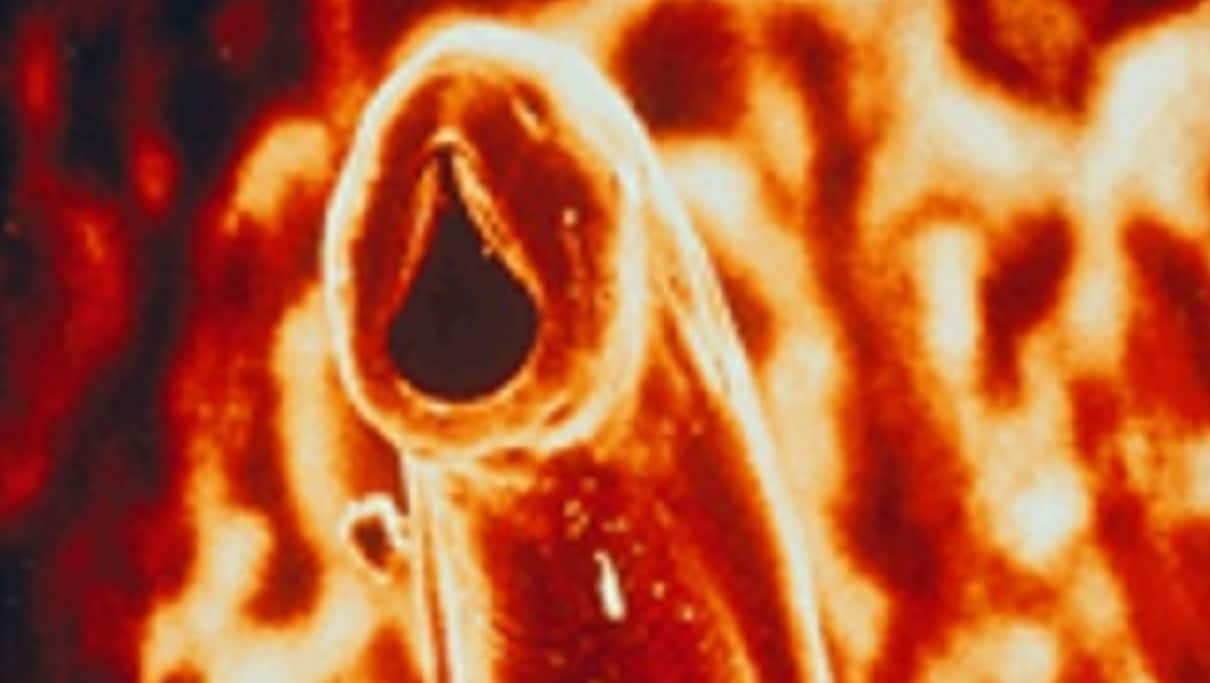Key points
- Hookworms are parasitic worms that live in your small intestines.
- You can get hookworms by walking barefoot on contaminated soil.
- Hookworm infections are treatable with medication.

Overview
Hookworms are parasitic worms that infect roughly 406 – 480 million people globally. The name comes from the hook-like shape of its head. The larvae (immature worms) and adult worms live in a person’s small intestines. A person infected with hookworm passes the eggs in their feces (poop). People get hookworm infection by walking barefoot on or consuming contaminated soil.
Types
Species
The two main species of hookworm infecting people are Ancylostoma duodenale and Necator americanus. Hookworm, along with Ascaris and whipworm, are known as soil-transmitted helminths (parasitic worms) as they spread in contaminated soil.
Symptoms
Some people infected with hookworm have either few or no symptoms at all.
However, if you do have symptoms, the first sign of infection often includes itching and a localized rash (in a specific part of the body; not widespread). This occurs when the larvae (immature worms) enter the skin. People with a heavy infection (high number of worms) may experience
- Abdominal pain
- Diarrhea
- Loss of appetite
- Weight loss
- Fatigue
- Anemia (A condition where there are not enough red blood cells in the body).
Hookworm infection can also slow the physical and cognitive growth of children.
At-risk populations
People at increased risk for hookworm infection include
- Those living in areas with warm and moist climates where sanitation and hygiene are poor, and
- Those who walk barefoot or allow their skin to have direct contact with contaminated soil.
- Children who play in contaminated soil.
Children
Heavy hookworm infections occur among both school-age children and adults. The most serious effects of hookworm infection are the development of anemia and protein (nutrient) deficiency caused by blood loss. These effects are more common in children. Blood loss happens because the adult worms attach to the intestines and feed on blood. When children are continuously infected by many worms, the protein deficiency and the loss of iron due to anemia can slow child growth and mental development.
Causes
Hookworm eggs pass in the feces of an infected person. Soil becomes contaminated when:
- People defecate (poop) outside or use unimproved sanitation facilities (when there is no sanitary separation of human waste from human contact).
- People use infected human feces as fertilizer for plants or vegetables.
The hookworm eggs then mature and hatch, releasing larvae. The larvae grow into a form that can penetrate (break through) the skin of humans. You can get hookworm infection by walking barefoot on contaminated soil. One kind of hookworm, Ancylostoma duodenale, can also spread through consuming larvae.
Prevention
To lower your risk of getting hookworm infection:
- Do not walk barefoot in areas where hookworm is common or where human feces contaminates the soil.
- Avoid skin-to-soil contact and consuming soil or water contaminated with feces (poop).
- Wash your hands with soap and water after going to the bathroom and before handling food.
- Wash, peel, and cook raw fruits and vegetables.
To prevent the spread of hookworm infection to others in your community
- Do not defecate outdoors, if possible.
- Use improved sanitation facilities (sanitary separation of human waste from human contact), if available, to ensure separation of human waste from human contact.
- Do not use human feces as fertilizer for crops.
- Teach children the importance of handwashing to prevent infections.
